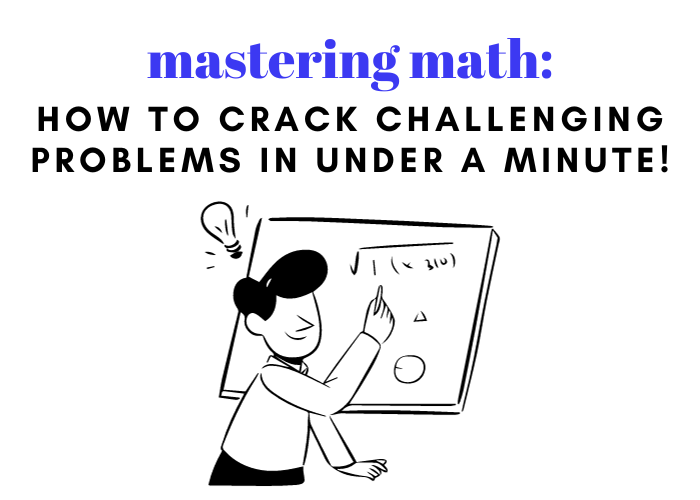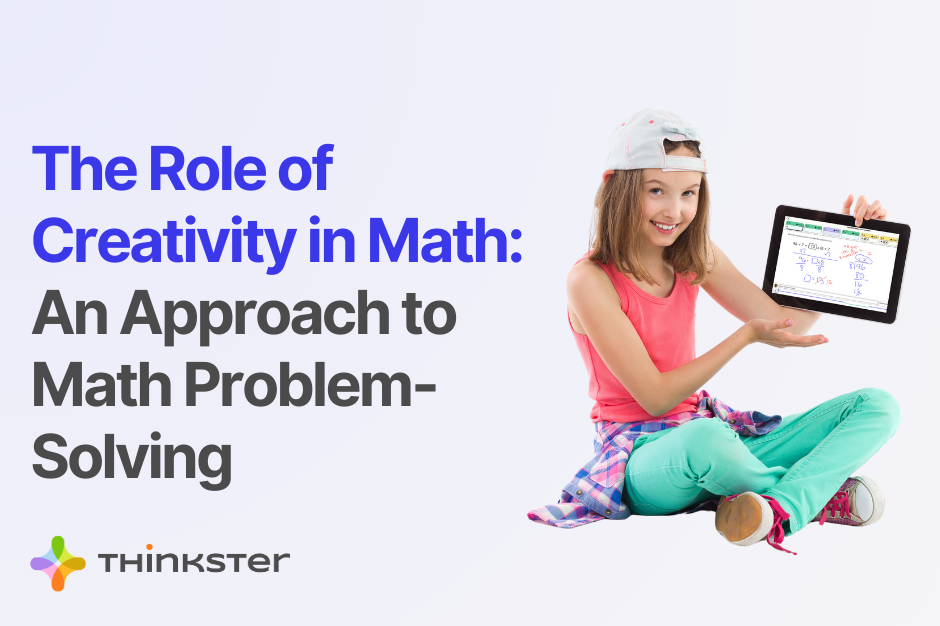
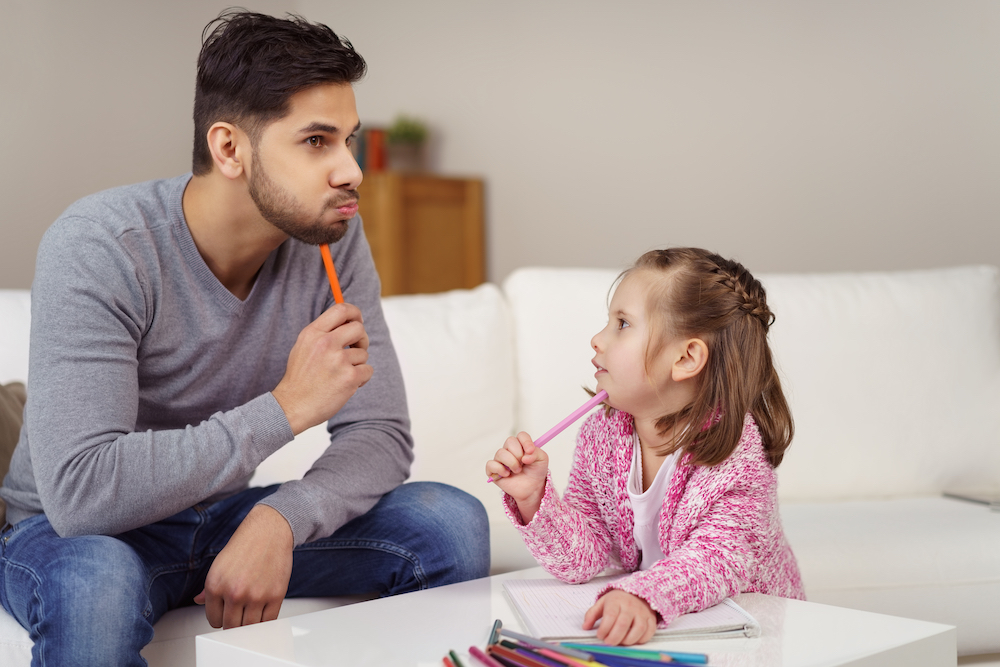
Last Updated on May 31, 2022 by Thinkster
Choosing, solidifying, and persevering with healthy habits is one way that both you and your children can feel proud of themselves and of your personal growth. It can be difficult to develop healthy habits, and children might be resistant at first to putting effort into something they can’t immediately benefit from.
Assuming habits form automatically—which, to some degree, they do—you’ve probably never thought about them besides feeling guilty for the ones you know are “bad”. While it is often true that they form on their own, you can also develop positive habits with intention, which can lead to some extremely positive life changes!
There are many reasons that developing healthy and worthwhile habits is beneficial, and starting at a young age can get your kids the head start you wish you’d had. We know they probably don’t care about forming healthy habits yet, which is why it’s important for you to begin the conversation now, and show them how healthy habits can set them up for success!
While your children are going to be developing both good and bad habits during this developmental part of their lives, there are certain habits that are important enough for them to work on. How can you get your kids to develop these habits? Let’s talk about it.
A habit is defined as “A settled or regular tendency or practice, especially one that is hard to give up.” – Oxford English Dictionary
More specifically, a habit is a process in your brain wherein you can perform routines and tasks automatically; without thinking. BMC Psychology did a study on how habits form in the brain, how they trigger a reward response, why that reward response is the best motivator for continued improved behavior, and how creating these habits in our brains can release dopamine to make us feel happier.
If you’re looking for the science behind why and how habits form, we highly recommend reading this quick article from Farnam Street. The biggest takeaway is that habits never fully leave us, and instead must be replaced with better ones.
So, now the big question: Why should you care about forming healthy habits in the first place?
If you’re the stellar parent we think you are (why else would you be here?), then you’re likely always looking for ways to improve as a person and as a parent. Forming and sticking with healthy lifelong habits can not only help you achieve that goal, but here are some scientifically proven benefits and rewards to positive habits such as eating healthy, exercising and reading daily, listening better, and self-affirmation:

Once you get into the groove of replacing bad habits with good ones, or beginning new habits that can make you feel great, you may just find you’re becoming a better version of yourself. Your kids will feel the difference too, and that could be just the spark they need to begin working on their own good habits!
Habits are a cycle of cue, action, and reward. Working on healthy habits from a young age is crucial in this process, as it teaches kids that they can create their own success. Additionally, the longer you do something, the more ingrained it becomes, and the easier it is to pick up even more healthy habits later on. As BMC Psychology states,
“Pleasure and intrinsic motivation can aid habit formation through promoting greater increase in habit strength per behaviour repetition. Perceived reward can therefore reinforce habits, beyond the impact of reward upon repetition.”
You already know that your kids love small rewards such as candy, play time, TV time, stickers, etc, so now it’s time you talked to them about less tangible rewards. We’re talking about the feelings of self-worth, accomplishment, and confidence that come with working on yourself.
We know it’s hard to explain this one to kids, since they probably already think they’re amazing. First of all, they are amazing, but what we want to focus on is teaching them to be amazing to others, and how good it can feel to do good.
The reason it’s so critical for your kids to begin this process while they’re still young is because doing so creates better adults, and better adults create a better society. Imagine a world where everyone’s mental health is balanced, physical activity is commonplace, and people default to charity and service.
Imagine this world for your kids, they probably want it as bad as you do.

We already learned that habits can form unconsciously or consciously. We understand now that you can direct your own habits and how doing so can improve your life and self-worth. However, not every habit is a good one, and not every bad habit is easily broken.
Again, habits must be replaced rather than removed. Knowing this, it can become easier to fight your bad tendencies. Here’s the step-by-step process to follow when trying to replace a bad habit with a good one:
Acknowledge your bad habit – If you are unaware of a bad habit, maybe sit down and go through your normal routine and search for any areas of improvement. If you are already aware of the habit you want to change, rather than becoming angry with yourself or chastising yourself for not being better, you need to accept the bad habit. Acknowledge that you’ve already formed the habit, then forgive yourself for it. We are all human beings, we all make choices and deal with life to the best of our ability. You’ve already decided you want to change, so it’s time to let go of the guilt and shame.
Come up with a game plan – Let’s say your bad habit is ordering an expensive coffee every day before work. Well, it’s time to sit down and figure out a way to overcome this habit. Recognize the reasons you want to change (saving money/time), then search for alternatives. This can include making coffee at home, investing in an espresso machine, or even trying different types of caffeine.
Get to work – This can be the hardest step in the process, but it is where the real change begins. Continuing with our coffee example, this is the part where you need to set reminders, leave yourself notes, put your coffee machine on a self-timer, and anything else you can think of to prevent a relapse. One important thing to remember during this step is that you are doing your best, and therefore can make a mistake, as long as you continue toward the bigger goal!
Reward your progress – Keep track of the progress you’ve made, and reward yourself for it! Did you make it five days in a row without buying a coffee? Time to go get your favorite brew. Did you make it even longer? Think about how good you feel, and maybe use the extra money you’ve saved to get yourself something fun. It’s important that you reward yourself for doing the right thing, otherwise you may revert back to your old habits as an easier form of reward.
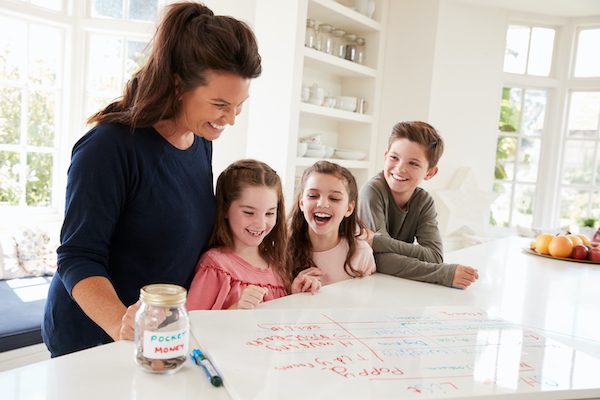
Your kids probably already have a few bad habits. But the process of rewiring the brain is the same. You can explain to them that picking their nose (not the worst habit to have, honestly) can be replaced by blowing their nose instead. You can explain that procrastinating their homework can be replaced by doing it first thing, thereby rewarding them with a night of fun instead of dreading that homework stack. Mott Children gets more in depth about how you can work with your kids on breaking their bad habits and replacing them with positive ones.
Now it’s time to apply everything we’ve learned about habit formation to you and your children. Developing healthy habits at a young age is really going to give your kids a boost when it comes to more difficult classes in school, success in college, and success in future careers. They’ll also feel happier, and in control of their own destiny.
These ones might be painful at first, but once they’re a habit, you’ll never regret having started them!
Statistics show that reading daily, even just for 10 minutes, helps the brain focus, facilitates learning, and grows a love of storytelling and narrative. Doing so with your children, whether that’s reading aloud to them or reading alongside them, helps with bonding and can spark an interest in future careers. Learn more about how to make reading a habit, and start to develop it for both you and your children.
Eating enough fruits, veggies, protein, and carbs daily fuels your body. We know you’ve heard this over and over again. Same goes for drinking enough water daily and limiting sugar intake. You already know how beneficial these healthy eating habits can be, but did you know that creating a love of eating healthy in children can help jumpstart them into other healthy patterns?
That’s right. If your kids feel better physically because they’re eating right, they’ll be better at knowing when they’re full, have more energy for school and extracurriculars, and want to continue other healthy habits.
Not only does exercising daily help your mental health in the moment, it also builds up your immunity, your strength, and your stamina. Meaning, you get better at exercising over time, which helps it to become a solid exercise habit. That cycle of habit-formation in your brain turns daily exercise from a chore into a reward.
Here are some creative ways that you can get your bodies up and moving year round that also help with bonding:

Stats on sleep—how much you need in relation to age and activity—have changed a lot over the years. It used to be that every person needed a standard of eight hours of sleep per day, and it was important to get them all at one time.
Now, things are a little different. Did you know that it might be better to split up your sleep? It’s called segmented sleep, and Webmd has a whole article on why it might be the solution you’ve been looking for if you’re not getting enough sleep.
It’s probably a struggle to get your kids to sleep enough, and when you want them to. However, if you can talk to your kids like adults and explain why sleep makes our lives better, it might be worth a try. Rather than holding them to a strict bedtime, let them choose when they’re tired and encourage naps to alleviate exhaustion.
Learn more about helping kids make sleep a habit.
Most kids are very messy. They simply do not have a concept of why it’s important to have a clean space. However, Very Well Mind knows how important having a clean and organized home and (for kids) bedroom is. Not only does it offer peace of mind, but it helps prevent germs and disease from cultivating.
Help your kids take control of their own peace of mind by teaching them how to clean, then checking in every now and then. Here are some great ways to get your kids interested in cleaning, without it having to be a huge battle every time! Pretty soon, your kids will develop solid organizational habits.
Finally, let’s talk about habits that make us better people!
There are so many ways that we can always be improving as people, and it’s never too late to get started. Here are just a few ways that you and your kids can begin some self-improvement, which can help you feel better about yourself and build relationships with people around you.
Seems straightforward, but if you think about all the tiny ways in which we lie to each other, you might need to revisit what honesty means to you and your kids. We know it’s important not to lie or steal, but what about the ways in which we lie to ourselves?
This ties in with the next topic, but it is so important that you not only acknowledge but actively fight against the ways we lie to ourselves. These white lies can include telling ourselves we are too much, too little, unintelligent, not motivated/driven, ugly, not trying hard enough, etc. The list goes on and on.
There are a few ways that we can break this habit of lying to ourselves:
Try out these methods with children too! Imagine how different you’d feel about yourself if you’d begun this process all the way back when you were young.
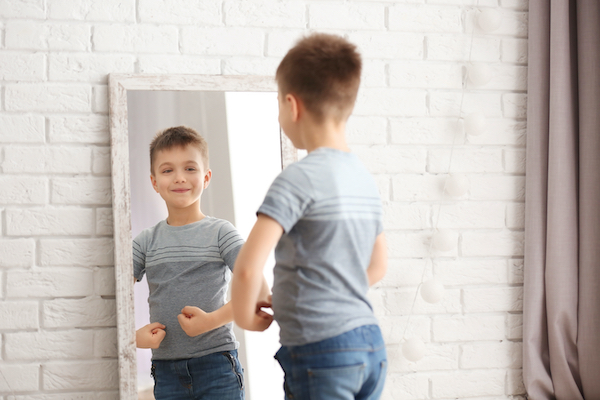
More than just combating the negative ways in which we feel about ourselves, we also have to be positive about life and the many things outside of our control. It can be so hard to relax when things feel serious or dangerous or nerve-wracking, but there are many fool-proof ways to help feel positive in times of stress, and just in general!
Once you start practicing positivity, you’ll start seeing some amazing changes in your personality and your life.
Managing your money is one habit that’s not only extremely difficult to maintain, but can be super hard to even begin; because you tend to justify every purchase as a necessity, right?
Well, there are hundreds of ways to help with money management, which is why we’ll let you figure out your personal best method for saving. However, when it comes to making money management a habit, the best advice we can give is to start young.
Talk to your kids about money and why it’s important to be smart about it. They may only have coins or a few dollars to spend, but talk about risk vs. reward and stress the importance of spending money on things that they will truly appreciate in the long run. Instant gratification isn’t always the best route.
One habit that we cannot get enough of is taking risks. Meaning, feeling that fear or nervousness and doing the thing anyway. Because there is nothing more worthwhile in life than to try new things. The rewards are just too great.
Every new thing you try might feel a little risky—applying for a new job, trying out for a musical, moving to a new city, or even getting a haircut—but there is no better way to learn. Learn about yourself, learn about the world, and learn about how to be a better person.
The way this becomes a habit goes back to the ‘cue’ in the habit cycle. Essentially, you need to train your brain to ‘take the plunge’ every time you feel something is a risk. Of course, be judicious and don’t take every risk that presents itself, but the process of asking yourself “Is this a risk worth taking?” should already be a habit.

Here are a few articles on why risk-taking is so beneficial. Talk to your kids about why trying new things and doing the things we’re afraid of actually can be so rewarding!
We hope all this talk about habit formation and habit replacement has helped you get started on your journey to a healthier you. We know you are eager to improve, and we’re here to cheer on you and your kids!
Happy habit-forming!

